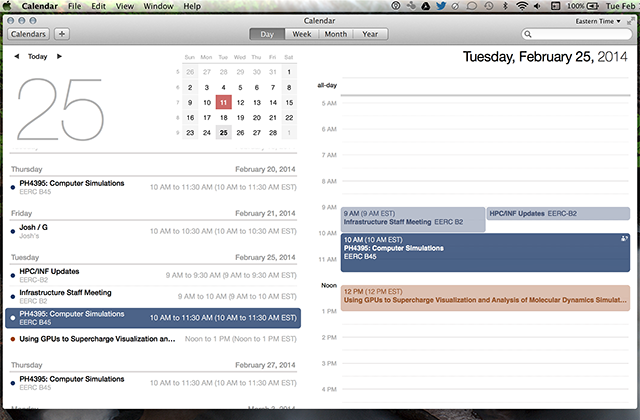Funding and other opportunities
Researchers may use the following URL to subscribe to these
events in a (smart phone) calendar application. Refer to the
subscription guidelines at the end of this page, if need be.
http://hpc.mtu.edu/MichiganTechResearchComputing.ics
Past opportunities
Please note that links to many of these can be stale or might not exist any more.
XSEDE Research Allocation for 2014/07/01 -- 2015/06/30
Deadline: 2014-04-15
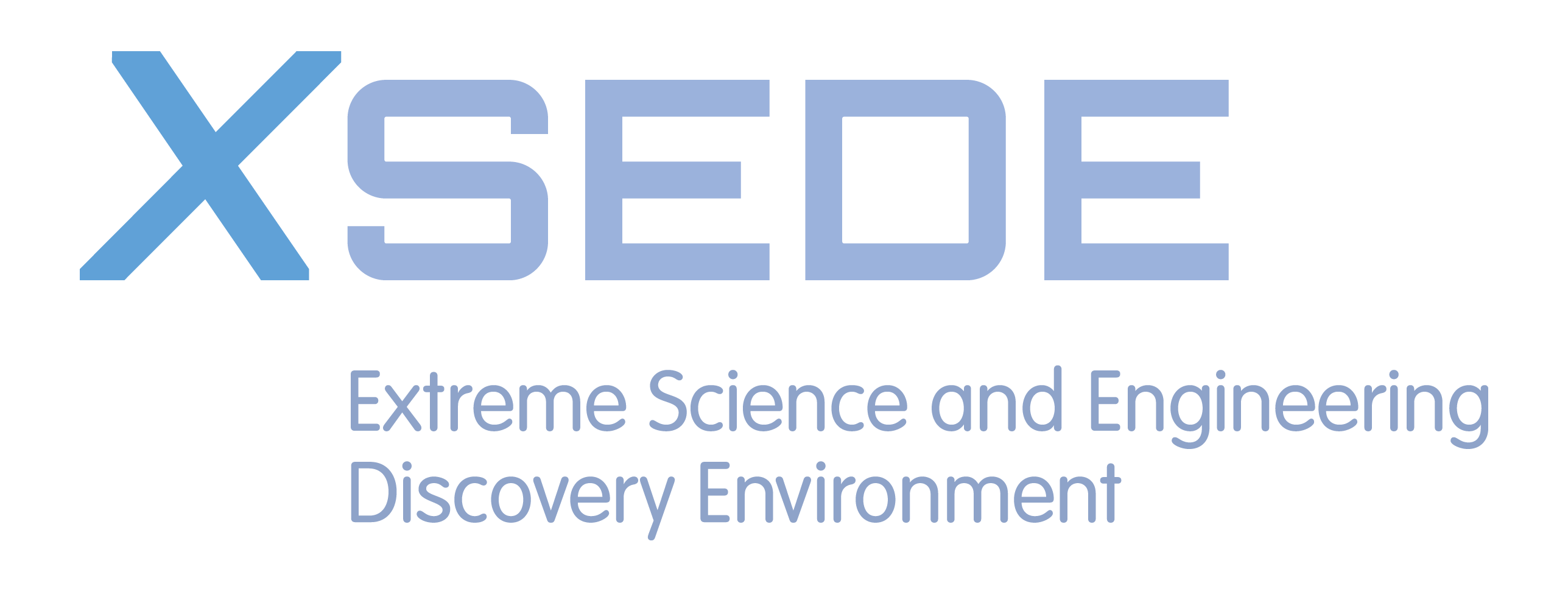 Researchers in need of computing resources greater than what is available
in-house (e.g., Portage, Superior, etc.) are strongly encouraged to apply
for an XSEDE allocation. The required proposal process is quite identical
and only a bit more elaborate than what Superior requires.
Researchers in need of computing resources greater than what is available
in-house (e.g., Portage, Superior, etc.) are strongly encouraged to apply
for an XSEDE allocation. The required proposal process is quite identical
and only a bit more elaborate than what Superior requires.
The XSEDE Resource Allocation System (XRAS) allows XSEDE users to submit
project allocation requests for the use of XSEDE compute, visualization
and storage resources. These requests are evaluated and granted by the
XSEDE Resource Allocation Committee (XRAC). Research allocation requests
are evaluated by the XRAC at quarterly meetings. More information about
XRAS is available at
https://portal.xsede.org/allocation-overview
https://portal.xsede.org/allocation-request-steps
Dr. Gowtham, Director of Research Computing and Michigan Tech's XSEDE Campus
Champion, can help either in pre-reviewing the proposal or exploring XSEDE
resources to find an optimal fit.
XSEDE Research Allocation for 2014/10/01 -- 2015/09/30
Deadline: 2014-07-15
 Researchers in need of computing resources greater than what is available
in-house (e.g., Portage, Superior, etc.) are strongly encouraged to apply
for an XSEDE allocation. The required proposal process is quite identical
and only a bit more elaborate than what Superior requires.
Researchers in need of computing resources greater than what is available
in-house (e.g., Portage, Superior, etc.) are strongly encouraged to apply
for an XSEDE allocation. The required proposal process is quite identical
and only a bit more elaborate than what Superior requires.
The XSEDE Resource Allocation System (XRAS) allows XSEDE users to submit
project allocation requests for the use of XSEDE compute, visualization
and storage resources. These requests are evaluated and granted by the
XSEDE Resource Allocation Committee (XRAC). Research allocation requests
are evaluated by the XRAC at quarterly meetings. More information about
XRAS is available at
https://portal.xsede.org/allocation-overview
https://portal.xsede.org/allocation-request-steps
Dr. Gowtham, Director of Research Computing and Michigan Tech's XSEDE Campus
Champion, can help either in pre-reviewing the proposal or exploring XSEDE
resources to find an optimal fit.
XSEDE Research Allocation for 2015/01/01 -- 2015/12/31
Deadline: 2014-10-15
 Researchers in need of computing resources greater than what is available
in-house (e.g., Portage, Superior, etc.) are strongly encouraged to apply
for an XSEDE allocation. The required proposal process is quite identical
and only a bit more elaborate than what Superior requires.
Researchers in need of computing resources greater than what is available
in-house (e.g., Portage, Superior, etc.) are strongly encouraged to apply
for an XSEDE allocation. The required proposal process is quite identical
and only a bit more elaborate than what Superior requires.
The XSEDE Resource Allocation System (XRAS) allows XSEDE users to submit
project allocation requests for the use of XSEDE compute, visualization
and storage resources. These requests are evaluated and granted by the
XSEDE Resource Allocation Committee (XRAC). Research allocation requests
are evaluated by the XRAC at quarterly meetings. More information about
XRAS is available at
https://portal.xsede.org/allocation-overview
https://portal.xsede.org/allocation-request-steps
Dr. Gowtham, Director of Research Computing and Michigan Tech's XSEDE Campus
Champion, can help either in pre-reviewing the proposal or exploring XSEDE
resources to find an optimal fit.
NSF Graduate Research Fellowship Program
Deadline: 2014-11-07
 The NSF Graduate Research Fellowship Program recognizes and supports
outstanding graduate students in NSF-supported science, technology,
engineering, and mathematics disciplines who are pursuing research-based
Master's and doctoral degrees at accredited United States institutions.
The NSF Graduate Research Fellowship Program recognizes and supports
outstanding graduate students in NSF-supported science, technology,
engineering, and mathematics disciplines who are pursuing research-based
Master's and doctoral degrees at accredited United States institutions.
http://www.nsfgrfp.org/
Each Fellowship consists of three years of support during a five-year
fellowship period. NSF provides a stipend of $32k to the Fellow and a
cost-of-education allowance of $12k to the graduate degree-granting
institution for each Fellow utilizing the fellowship support in a fellowship
year.
Applicants must be US citizens or have a national/permanent resident status,
and fellowships are awarded to applicants in the early stages of their
graduate study.
FBI Cyber Internship Program
Deadline: 2014-12-01
 The program offers undergraduate (sophomore, junior or senior), graduate or
post-doctorate students throughout the nation, an opportunity to assist in
investigating and preventing the most sophisticated computer threats around
the globe.
The program offers undergraduate (sophomore, junior or senior), graduate or
post-doctorate students throughout the nation, an opportunity to assist in
investigating and preventing the most sophisticated computer threats around
the globe.
Interns studying in cyber-related information technology fields will have
opportunities within the Cyber Division, Operational Technology Division,
Security Division, Informational Technology Branch as well as working in
Counterintelligence, Counterterrorism, and Criminal Intrusion matters with a
nexus to National Security.
Responsibilities will include addressing the cyber criminal threats,
providing strategic and field office operational support and assisting with
the development and implementation of various software analysis tools. In
addition, interns will collaborate with various elements within FBIHQ, the
intelligence community and international partners on mitigation strategies,
and will produce intelligence products and provide administrative support.
https://www.fbijobs.gov/2311.asp
Applicants must be US citizens and must be enrolled and attending college, or
university, full-time, that is accredited by one of the regional or national
institutional associations recognized by the United States Secretary
Education. The internship runs from June 1, 2015 through August 7, 2015.
CADENS
Deadline: 2014-12-21
 CADENS (The Centrality of Advanced Digitally ENabled Science) is a
NSF-supported project to increase digital literacy and inform the general
public about computational and data-enabled scientific discovery.
CADENS (The Centrality of Advanced Digitally ENabled Science) is a
NSF-supported project to increase digital literacy and inform the general
public about computational and data-enabled scientific discovery.
It is led by Donna Cox, director of the Advanced Visualization Laboratory at
the NCSA, which has created data-driven visualizations seen by millions of
people in productions for IMAX theaters, planetariums, museums, and science
television programs. Other project collaborators are Thomas Lucas,
producer/director of more than 30 major science documentary films; and the
Blue Waters and Extreme Science and Engineering Discovery Environment (XSEDE)
projects.
http://www.ncsa.illinois.edu/enabling/vis/cadens/cfp
Researchers who are interested in collaborating on this project can submit
information on their data and/or visualizations at
http://go.illinois.edu/cadens
XSEDE Research Allocation for 2015/04/01 -- 2016/03/31
Deadline: 2015-01-15
 Researchers in need of computing resources greater than what is available
in-house (e.g., Portage, Superior, etc.) are strongly encouraged to apply
for an XSEDE allocation. The required proposal process is quite identical
and only a bit more elaborate than what Superior requires.
Researchers in need of computing resources greater than what is available
in-house (e.g., Portage, Superior, etc.) are strongly encouraged to apply
for an XSEDE allocation. The required proposal process is quite identical
and only a bit more elaborate than what Superior requires.
The XSEDE Resource Allocation System (XRAS) allows XSEDE users to submit
project allocation requests for the use of XSEDE compute, visualization
and storage resources. These requests are evaluated and granted by the
XSEDE Resource Allocation Committee (XRAC). Research allocation requests
are evaluated by the XRAC at quarterly meetings. More information about
XRAS is available at
https://portal.xsede.org/allocation-overview
https://portal.xsede.org/allocation-request-steps
Dr. Gowtham, Director of Research Computing and Michigan Tech's XSEDE Campus
Champion, can help either in pre-reviewing the proposal or exploring XSEDE
resources to find an optimal fit.
Blue Waters Graduate Fellowship
Deadline: 2015-02-04
 Applications are now being accepted for the prestigious Blue Waters Graduate
Fellowship. The fellowship is designed to support PhD students who are engaged
in a program of study and research that is directly relevant to the use of the
Blue Waters supercomputer:
Applications are now being accepted for the prestigious Blue Waters Graduate
Fellowship. The fellowship is designed to support PhD students who are engaged
in a program of study and research that is directly relevant to the use of the
Blue Waters supercomputer:
https://bluewaters.ncsa.illinois.edu/
Recipients will earn a stipend of $38k for the year-long fellowship and up to
a $12k tuition allowance. Fellowship applicants should be in the second or
third year of their PhD program and engaged in research that can take
advantage of the Blue Waters supercomputer. Applicants must be US citizens or
landed immigrants.
More information about the fellowship can be found at:
https://bluewaters.ncsa.illinois.edu/fellowships
International HPC Summer School
Deadline: 2015-03-11
 Graduate students and post-doctoral scholars from institutions in Canada,
Europe, Japan and the United States are invited to apply for the sixth
International Summer School on HPC Challenges in Computational Sciences, to
be held June 21-26, 2015, in Toronto, Canada.
Graduate students and post-doctoral scholars from institutions in Canada,
Europe, Japan and the United States are invited to apply for the sixth
International Summer School on HPC Challenges in Computational Sciences, to
be held June 21-26, 2015, in Toronto, Canada.
The summer school is sponsored by Compute/Calcul Canada, the Extreme Science
and Engineering Discovery Environment (XSEDE) with funds from the US National
Science Foundation, the Partnership for Advanced Computing in Europe (PRACE)
and the RIKEN Advanced Institute for Computational Science (RIKEN AICS).
Leading Canadian, European, Japanese and American computational scientists and
HPC technologists will offer instruction on a variety of topics, including
HPC challenges by discipline (e.g, earth, life and materials sciences,
physics), HPC programming proficiencies, performance analysis and profiling,
algorithmic approaches and numerical libraries, data-intensive computing,
scientific visualization, and Canadian, EU, Japanese and US
HPC-infrastructures.
The expense-paid program will benefit advanced scholars from Canadian,
European, Japanese and US institutions who use HPC to conduct research.
Meals, housing, and travel will be covered for the selected participants.
Preference will be given to applicants with parallel programming experience,
and a research plan that will benefit from the utilization of high performance
computing systems.
More information about the internship can be found at:
https://www.xsede.org/2015-international-summer-school
National Data Science Bowl
Deadline: 2015-03-16
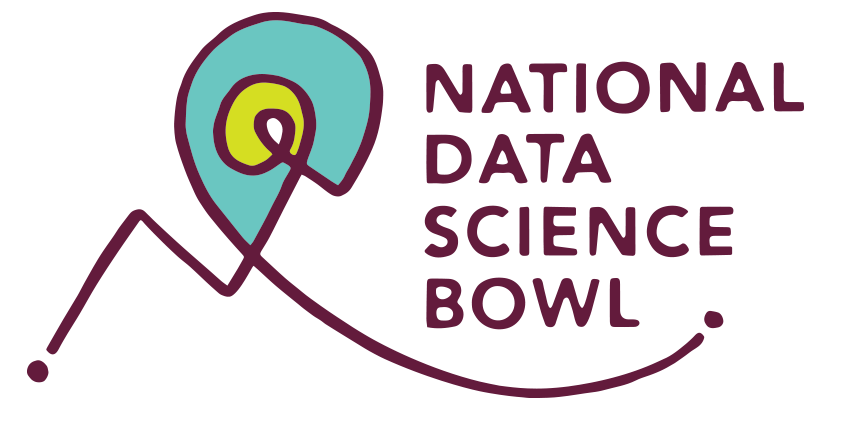 The competition offers data scientists a platform through which individuals
can harness their passion, unleash their curiosity and amplify their impact to
affect change on a global scale.
The competition offers data scientists a platform through which individuals
can harness their passion, unleash their curiosity and amplify their impact to
affect change on a global scale.
Throughout the competition, participants will be asked to examine nearly 10,000
underwater images, provided by the Hatfield Marine Science Center. They will
use these images to develop an algorithm that will enable researchers to
monitor species of plankton at a speed and scale never before possible. The
resulting algorithm will serve as an estimated $4 million in-kind donation and
will be available to the marine research community for long-term reference and
use.
Extremely susceptible to changes in temperature and chemistry, a large and
thriving plankton population is crucial to driving some of the planet's most
life-sustaining processes. These organisms manage nearly half the the total
carbon in Earth's oceans and atmosphere and form the foundation for marine
and terrestrial food chains. Rapid assessment of their populations will allow
the scientific community to monitor ocean health at an unprecedented scale,
an important step forward in understanding and protecting the environment.
The competition is open to participants 18 years or older, and the award
includes $175,000 to the top three individiual contests and top academic team.
more information about the National Data Science Bowl can be found at
http://www.datasciencebowl.com
Blue Waters Internship Program
Deadline: 2015-03-20
 As part of the Blue Waters efforts to motivate and train the next generation
of supercomputing researchers, the program is sponsoring 20 undergraduate
research interns each year. The goal is to engage undergraduate students in
petascale computing research and development projects.
As part of the Blue Waters efforts to motivate and train the next generation
of supercomputing researchers, the program is sponsoring 20 undergraduate
research interns each year. The goal is to engage undergraduate students in
petascale computing research and development projects.
The program provides each student a stipend totaling $5,000 and a two-week
intensive high-performance computing workshop. Select students will travel to
The Blue Waters Symposium. This program includes support for
undergraduate internship activities at any accredited degree granting
institution in the United States.
The internships awarded through this program may be for students working with
a faculty mentor on their home campus, or at another campus. Interested
faculty can work with a particular student that they identify, or may select
a qualified student with Blue Waters support through our program.
More information about the internship can be found at:
https://bluewaters.ncsa.illinois.edu/internships
http://www.shodor.org/petascale/participation/internships
XSEDE Research Allocation for 2015/07/01 -- 2016/06/30
Deadline: 2015-04-15
 Researchers in need of computing resources greater than what is available
in-house (e.g., Portage, Superior, etc.) are strongly encouraged to apply
for an XSEDE allocation. The required proposal process is quite identical
and only a bit more elaborate than what Superior requires.
Researchers in need of computing resources greater than what is available
in-house (e.g., Portage, Superior, etc.) are strongly encouraged to apply
for an XSEDE allocation. The required proposal process is quite identical
and only a bit more elaborate than what Superior requires.
The XSEDE Resource Allocation System (XRAS) allows XSEDE users to submit
project allocation requests for the use of XSEDE compute, visualization
and storage resources. These requests are evaluated and granted by the
XSEDE Resource Allocation Committee (XRAC). Research allocation requests
are evaluated by the XRAC at quarterly meetings. More information about
XRAS is available at
https://portal.xsede.org/allocation-overview
https://portal.xsede.org/allocation-request-steps
Dr. Gowtham, Director of Research Computing and Michigan Tech's XSEDE Campus
Champion, can help either in pre-reviewing the proposal or exploring XSEDE
resources to find an optimal fit.
Arches Project Developer
Deadline: 2015-06-15
 Dr. Patrick Martin,
professor in Social Sciences, is looking to hire a staff or a
(undergraduate/graduate) student for implementing an online inventory
using Arches, an
open source platform. Interested candidates will need to be familiar with
Django, Python and Javascript, and can contact Dr. Martin for additional
information.
Dr. Patrick Martin,
professor in Social Sciences, is looking to hire a staff or a
(undergraduate/graduate) student for implementing an online inventory
using Arches, an
open source platform. Interested candidates will need to be familiar with
Django, Python and Javascript, and can contact Dr. Martin for additional
information.
XSEDE Research Allocation for 2015/10/01 - 2016/09/30
Deadline: 2015-07-15
 Researchers in need of computing resources greater than what is available
in-house (e.g., Portage, Superior, etc.) are strongly encouraged to apply
for an XSEDE allocation. The required proposal process is quite identical
and only a bit more elaborate than what Superior requires.
Researchers in need of computing resources greater than what is available
in-house (e.g., Portage, Superior, etc.) are strongly encouraged to apply
for an XSEDE allocation. The required proposal process is quite identical
and only a bit more elaborate than what Superior requires.
The XSEDE Resource Allocation System (XRAS) allows XSEDE users to submit
project allocation requests for the use of XSEDE compute, visualization
and storage resources. These requests are evaluated and granted by the
XSEDE Resource Allocation Committee (XRAC). Research allocation requests
are evaluated by the XRAC at quarterly meetings. More information about
XRAS is available at
https://portal.xsede.org/allocation-overview
https://portal.xsede.org/allocation-request-steps
Dr. Gowtham, Director of Research Computing and Michigan Tech's XSEDE Campus
Champion, can help either in pre-reviewing the proposal or exploring XSEDE
resources to find an optimal fit.
XSEDE Research Allocation for 2016/01/01 - 2016/12/31
Deadline: 2015-10-15
 Researchers in need of computing resources greater than what is available
in-house (e.g., Portage, Superior, etc.) are strongly encouraged to apply
for an XSEDE allocation. The required proposal process is quite identical
and only a bit more elaborate than what Superior requires.
Researchers in need of computing resources greater than what is available
in-house (e.g., Portage, Superior, etc.) are strongly encouraged to apply
for an XSEDE allocation. The required proposal process is quite identical
and only a bit more elaborate than what Superior requires.
The XSEDE Resource Allocation System (XRAS) allows XSEDE users to submit
project allocation requests for the use of XSEDE compute, visualization
and storage resources. These requests are evaluated and granted by the
XSEDE Resource Allocation Committee (XRAC). Research allocation requests
are evaluated by the XRAC at quarterly meetings. More information about
XRAS is available at
https://portal.xsede.org/allocation-overview
https://portal.xsede.org/allocation-request-steps
Dr. Gowtham, Director of Research Computing and Michigan Tech's XSEDE Campus
Champion, can help either in pre-reviewing the proposal or exploring XSEDE
resources to find an optimal fit.
NSF Graduate Research Fellowship Program
Deadline: 2015-11-05
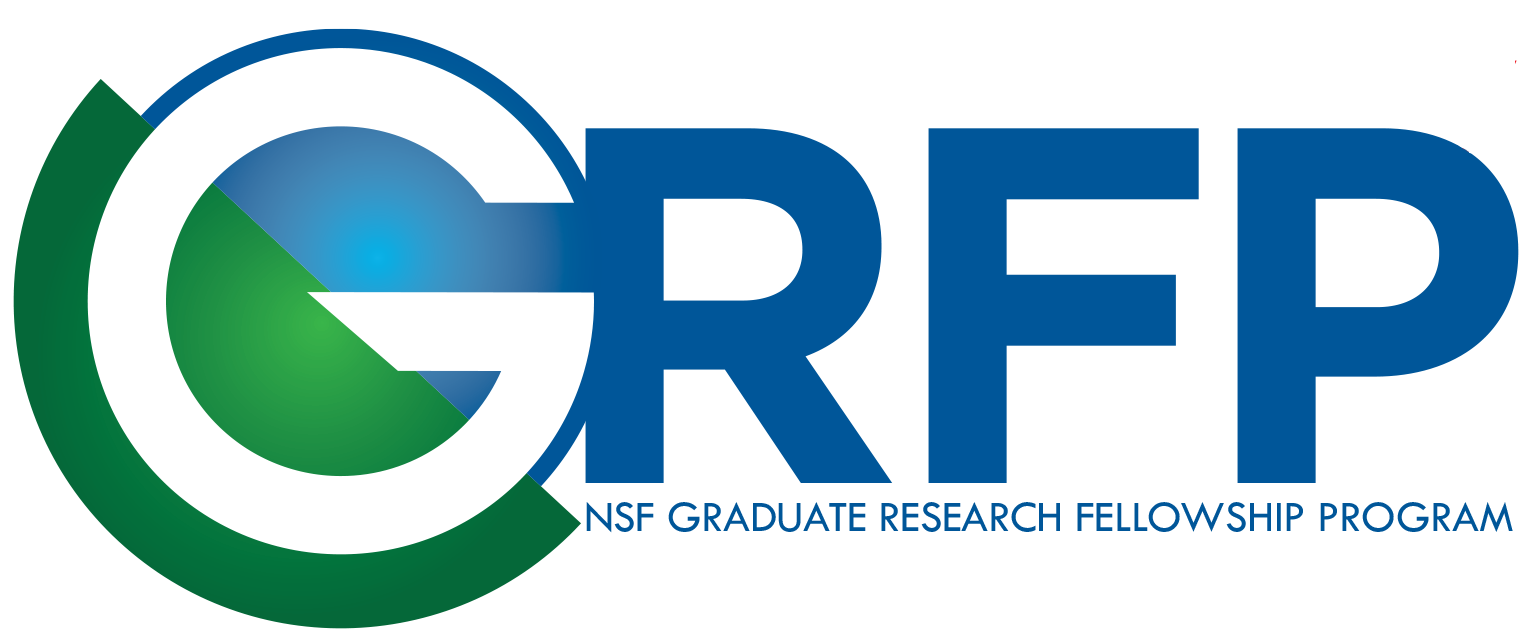 The NSF Graduate Research Fellowship Program recognizes and supports
outstanding graduate students in NSF-supported science, technology,
engineering, and mathematics disciplines who are pursuing research-based
Master's and doctoral degrees at accredited United States institutions.
The NSF Graduate Research Fellowship Program recognizes and supports
outstanding graduate students in NSF-supported science, technology,
engineering, and mathematics disciplines who are pursuing research-based
Master's and doctoral degrees at accredited United States institutions.
http://www.nsfgrfp.org/
Each Fellowship consists of three years of support during a five-year
fellowship period. NSF provides a stipend of $34k to the fellow and a
cost-of-education allowance of $12k to the graduate degree-granting
institution for each Fellow utilizing the fellowship support in a fellowship
year.
Applicants must be US citizens or have a national/permanent resident status,
and fellowships are awarded to applicants in the early stages of their
graduate study.
CADENS
Deadline: 2015-11-30
 CADENS (The Centrality of Advanced Digitally ENabled Science) is a
NSF-supported project to increase digital literacy and inform the general
public about computational and data-enabled scientific discovery.
CADENS (The Centrality of Advanced Digitally ENabled Science) is a
NSF-supported project to increase digital literacy and inform the general
public about computational and data-enabled scientific discovery.
It is led by Donna Cox, director of the Advanced Visualization Laboratory at
the NCSA, which has created data-driven visualizations seen by millions of
people in productions for IMAX theaters, planetariums, museums, and science
television programs. Other project collaborators are Thomas Lucas,
producer/director of more than 30 major science documentary films; and the
Blue Waters and Extreme Science and Engineering Discovery Environment (XSEDE)
projects.
http://www.ncsa.illinois.edu/enabling/vis/cadens/cfp
Researchers who are interested in collaborating on this project can submit
information on their data and/or visualizations at
http://go.illinois.edu/cadens
XSEDE Research Allocation for 2016/04/01 - 2017/13/31
Deadline: 2016-01-15
 Researchers in need of computing resources greater than what is available
in-house (e.g., Portage, Superior, etc.) are strongly encouraged to apply
for an XSEDE allocation. The required proposal process is quite identical
and only a bit more elaborate than what Superior requires.
Researchers in need of computing resources greater than what is available
in-house (e.g., Portage, Superior, etc.) are strongly encouraged to apply
for an XSEDE allocation. The required proposal process is quite identical
and only a bit more elaborate than what Superior requires.
The XSEDE Resource Allocation System (XRAS) allows XSEDE users to submit
project allocation requests for the use of XSEDE compute, visualization
and storage resources. These requests are evaluated and granted by the
XSEDE Resource Allocation Committee (XRAC). Research allocation requests
are evaluated by the XRAC at quarterly meetings. More information about
XRAS is available at
https://portal.xsede.org/allocation-overview
https://portal.xsede.org/allocation-request-steps
Dr. Gowtham, Director of Research Computing and Michigan Tech's XSEDE Campus
Champion, can help either in pre-reviewing the proposal or exploring XSEDE
resources to find an optimal fit.
DOE Computational Science Graduate Fellowship
Deadline: 2016-01-19

http://www.krellinst.org/csgf/
Fellowship is renewable up to 4 years and includes $36k of stipend per year
as well as full tuition and other fees. It also provides $5k academic allowance in
first year and $1k academic allowance for each renewed year. Successful candidates
will have the opportunity to attend the annual program review and a
12-week research practicum.
Applicant need not be a US citizen but must be a doctoral candidate in fields of
study that utilize high performance computing to solve complex problems in
science and engineering.
Blue Waters Student Internship Program
Deadline: 2016-02-01
 As part of the Blue Waters efforts to motivate and train the next generation
of supercomputing researchers, the program is sponsoring 20 undergraduate
research interns each year. The goal is to engage undergraduate students in
petascale computing research and development projects.
As part of the Blue Waters efforts to motivate and train the next generation
of supercomputing researchers, the program is sponsoring 20 undergraduate
research interns each year. The goal is to engage undergraduate students in
petascale computing research and development projects.
The program provides each student a stipend totaling $5,000 and a two-week
intensive high-performance computing workshop. Select students will travel to
The Blue Waters Symposium. This program includes support for
undergraduate internship activities at any accredited degree granting
institution in the United States.
The internships awarded through this program may be for students working with
a faculty mentor on their home campus, or at another campus. Interested
faculty can work with a particular student that they identify, or may select
a qualified student with Blue Waters support through our program.
More information about the internship can be found at:
https://bluewaters.ncsa.illinois.edu/internships
http://www.shodor.org/petascale/participation/internships
Michigan Tech Research Computing Calendar Subscription: GMail
- Go to https://calendar.google.com/ and login using your credentials.
- Complete the steps at
https://support.google.com/calendar/answer/37100?hl=en
using http://hpc.mtu.edu/MichiganTechResearchComputing.ics
as the calendar URL. When you're finished, you should
see a new Michigan Tech Research Computing
calendar under Other calendars on the left.
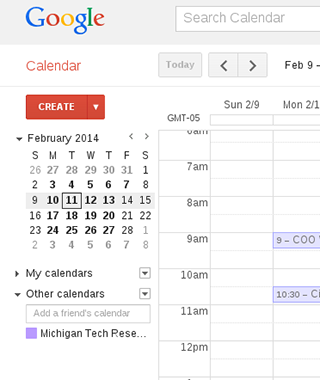
Michigan Tech Research Computing Calendar Subscription: Android
- Go to https://calendar.google.com/ and login using a Google account that is also set up on your Android device.
- Complete the steps at
https://support.google.com/calendar/answer/37100?hl=en
using http://hpc.mtu.edu/MichiganTechResearchComputing.ics
as the calendar URL. When you're finished, you should
see a new Michigan Tech Research Computing
calendar under Other calendars on the left.

- On your Android device, start the Calendar app.
Select the menu, then tap Calendars to display
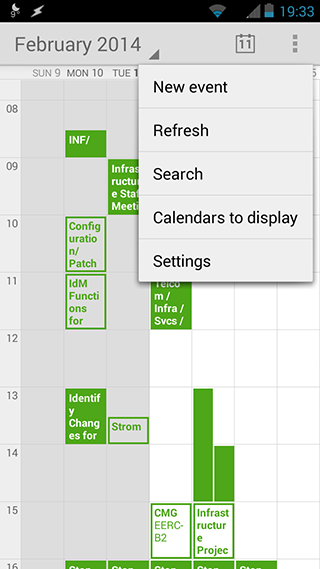
- Tap Calendars to sync near the bottom
of the screen. You should see the new
Michigan Tech Research Computing
calendar in the list. Tap the box to make the
calendar available to your device.
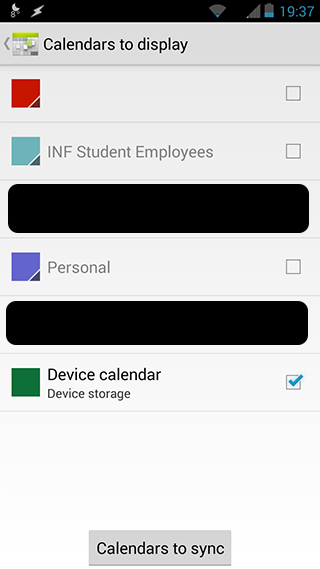
- Tap OK and then go back to the calendar
view. The new webinar events will now be displayed
on your calendar.
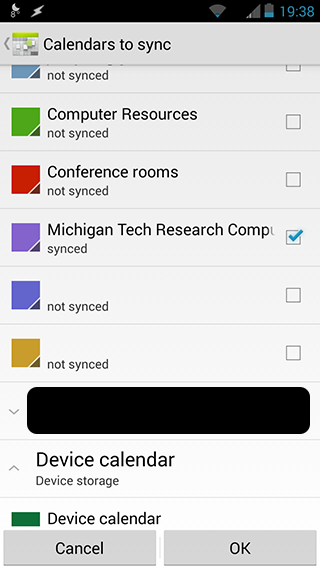
Michigan Tech Research Computing Calendar Subscription: iPhone
- Tap on Settings

- Tap on Mail, Contacts, Calendars
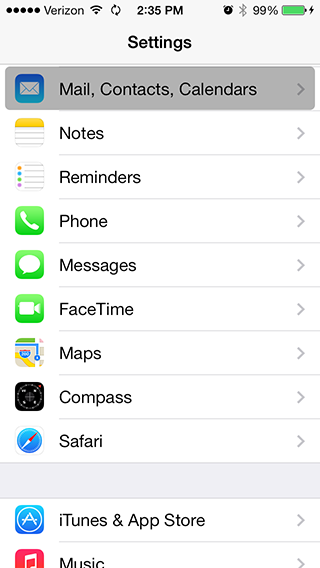
- Tap on Add Account
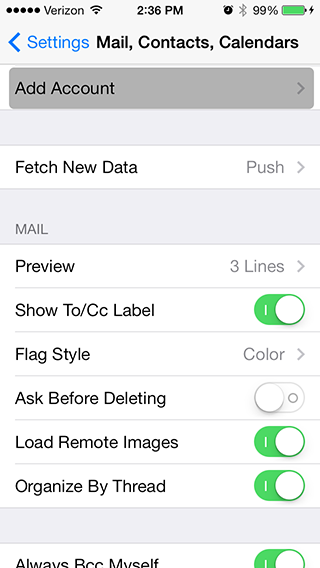
- Tap on Other

- Tap on Add Subscribed Calendar
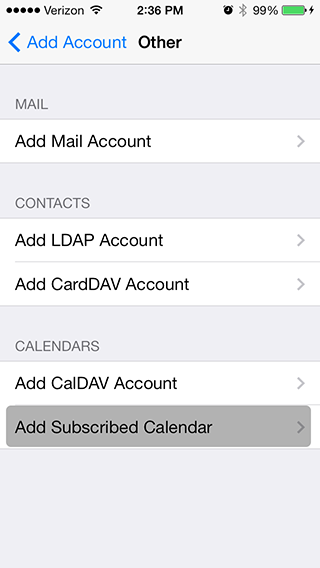
- Enter http://hpc.mtu.edu/MichiganTechResearchComputing.ics
and tap on Next
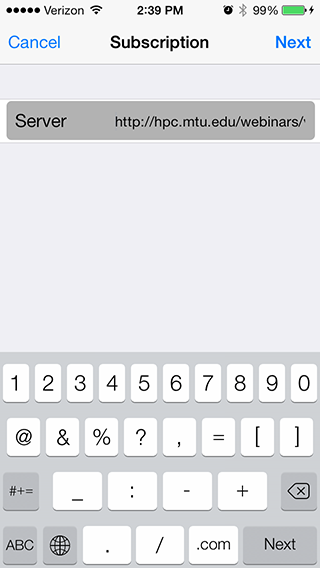
- Tap on Save
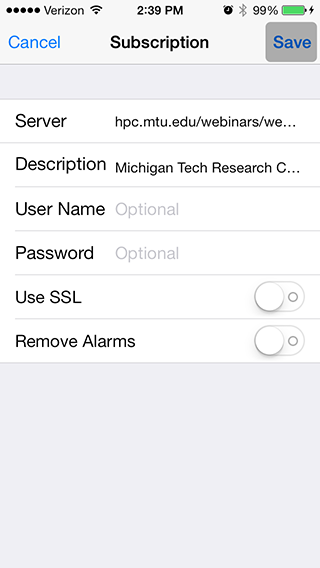
- Subscribed Calendars should now look like
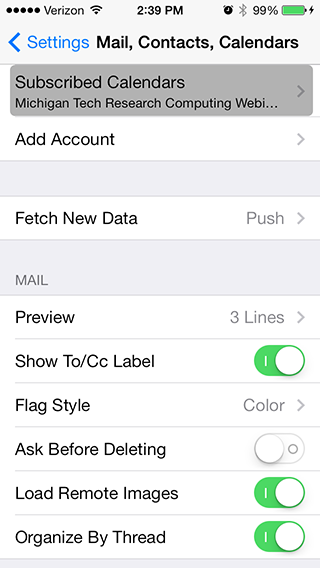
- Open the Calendar app and change the color
associated with this calendar, if need be.
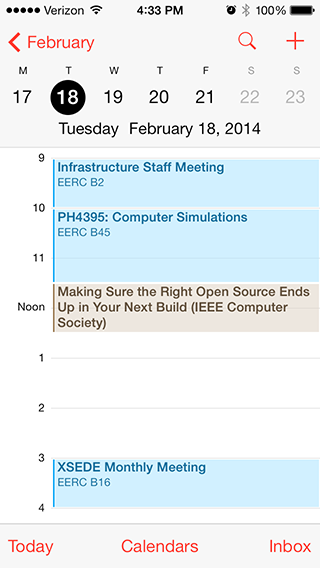
Michigan Tech Research Computing Calendar Subscription: iCal
- Click on File → New Calendar Subscription
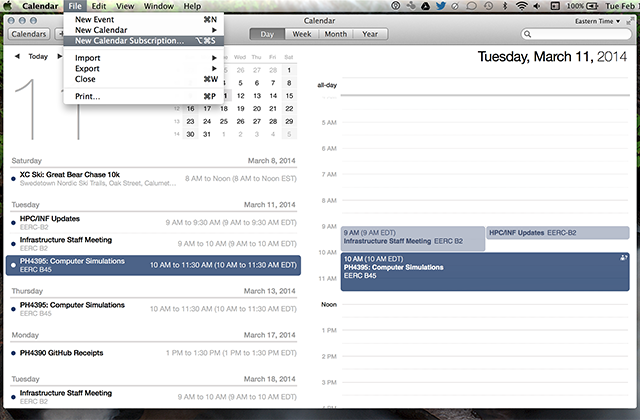
- Enter http://hpc.mtu.edu/MichiganTechResearchComputing.ics
and click on Subscribe
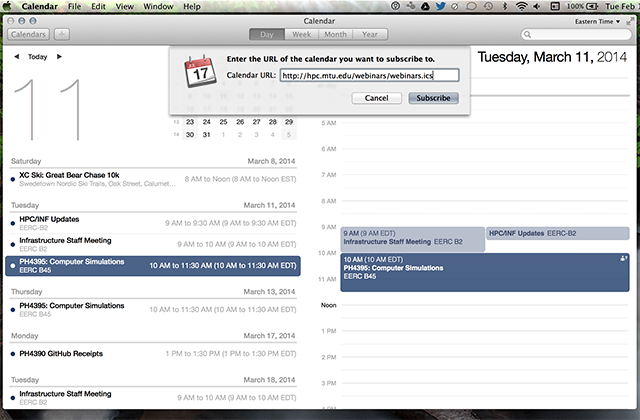
- Select an appropriate color, auto-refresh interval, etc. and click on OK
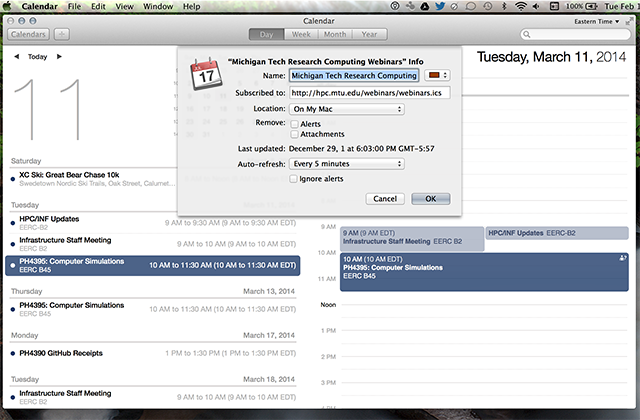
- iCal should now look like
